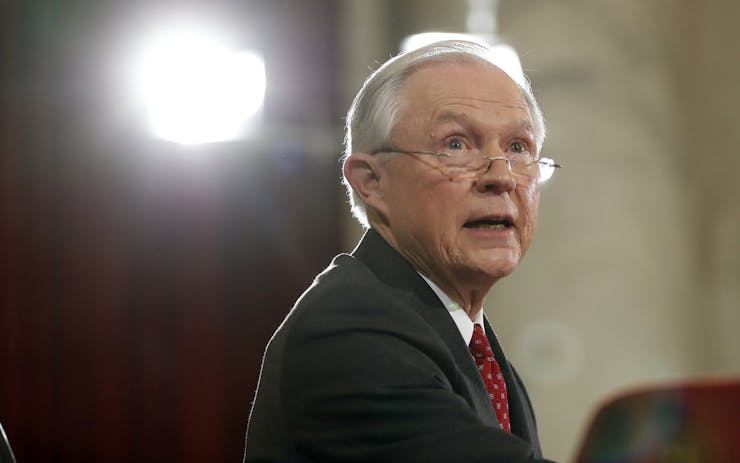During confirmation hearings in the Senate this month, Sen. Jeff Sessions, President Donald Trump’s nominee for US attorney general, left observers guessing as to whether he plans to crack down in states that have legalized cannabis. And if patients and businesses were hoping his written responses to policy questions would provide any added insight, they’re likely to be disappointed.
In his written replies to questions from fellow senators, which Sessions submitted last week, the Alabama Republican for the most part echoed what he has said previously about his intent to enforce federal law in states that have legalized cannabis, noting both the fact that cannabis remains illegal under the federal Controlled Substances Act and the reality that the Department of Justice must prioritize enforcement resources.
“The exact balance of enforcement priorities is an ever-changing determination based on the circumstances and the resources available at the time,” Sessions wrote. Nevertheless, he emphasized, cannabis “is still a criminal substance under federal law.”
Asked whether he intends to follow the Cole memo, a Department of Justice document that set a policy of not interfering with state-legal cannabis, Sessions again declined to commit to anything more than his intent to “review and evaluate” the policy.
“While I am generally familiar with the Cole memorandum, I am not privy to any internal Department of Justice data regarding the effectiveness of the policies contained within that memorandum,” Sessions wrote. “If I am fortunate enough to be confirmed as Attorney General, I will certainly review and evaluate those policies, including the original justifications for the memorandum, as well as any relevant data and how circumstances may have changed or how they may change in the future.”
It is important, Sessions added, that the government knows as much as possible about the health-related and other impacts of cannabis consumption.
“If I am fortunate enough to be confirmed as Attorney General, I will defer to the American Medical Association and the researchers at the National Institutes of Health and elsewhere about the medical effects of marijuana,” he wrote. “Without having studied the relevant regulations in depth, I cannot say whether they may need to be eased in order to advance research; but, I will review this. If confirmed, will be to enforce federal law, under which marijuana is currently a Schedule One controlled substance—defined as a drug with no currently accepted medical use and a high potential for abuse.”
Sessions, famously, is no friend of cannabis. He once joked that he felt Ku Klux Klan members “were OK until I found out they smoked pot,” and is on the record as saying that “good people don’t smoke marijuana.” In his written statements, the senator claimed his words were taken out of context.
“My words have been grossly mischaracterized and taken out of context,” he wrote. “I was discussing the value of treating people for using dangerous and illegal drugs like marijuana, and the context in which treatment is successful.”
Senators were initially slated to vote Tuesday on whether to confirm Sessions, but Democrats in the Senate have delayed the vote in order to spend more time reviewing the Trump nominee. A panel vote will be held Jan. 31 and afterward will head to the Senate floor.
Despite his limited support from Democrats, uncertainty around cannabis, and rumors of racist behavior during his time as a federal prosecutor, Sessions is widely expected to be confirmed as attorney general, where he will set national law enforcement priorities.




